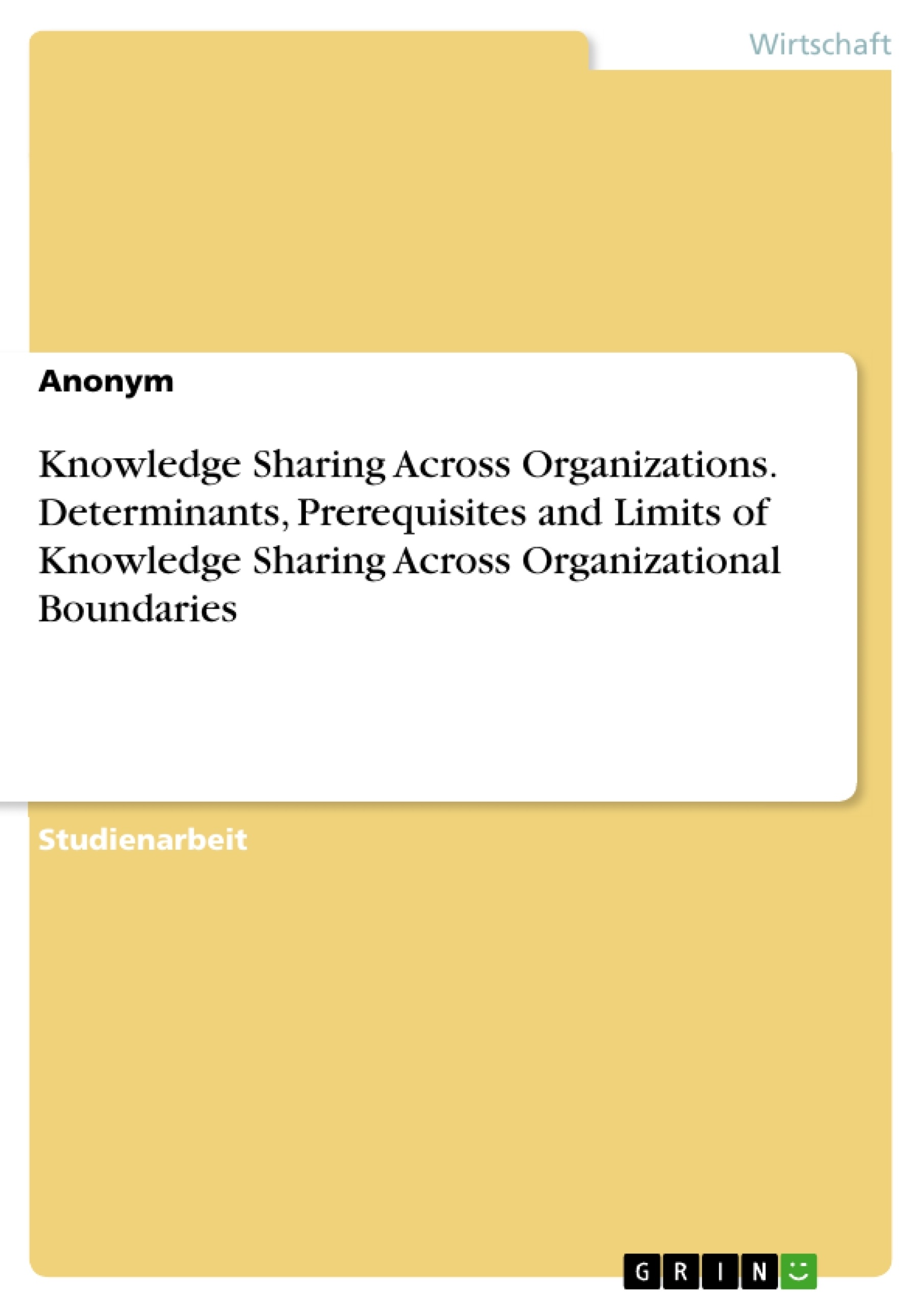Recently, various studies have identified knowledge as the most valuable resource and key factor in achieving sustainable competitive advantage. However, most organizations do not possess all crucial knowledge within their organizational boundaries and must rely on linkages across them.
Surprisingly, most existing studies focus on knowledge sharing in organizations within their boundaries. In particular, only few papers take into account which factors increase sharing and which factors hinder firms from sharing knowledge across organizational boundaries.
In order to fill this gap, this paper presents a review of the state-of-the-art literature on knowledge sharing across organizational boundaries. This paper will address the following research questions: Which key factors influence the decision whether knowledge is shared across organizational boundaries or not and how are these factors interlinked with each other?
The objective of this paper is to contribute to a better understanding of determining factors influencing interorganizational knowledge sharing. The present paper contributes to knowledge sharing discussions by shedding light on which factors have a significant impact on interorganizational knowledge sharing and how these factors are interrelated. Based on the literature I identified eight influential factors of interorganizational knowledge sharing and present a framework for understanding the different impacts among themselves.
Inhaltsverzeichnis
- 1 Introduction
- 2 Definitions
- 2.1 Knowledge sharing
- 2.2 Types of knowledge
- 3 Determinants of knowledge sharing across organizational boundaries
- 3.1 Influencing organizational factors of knowledge sharing across organizational boundaries
- 3.2 Influencing knowledge characteristic factors of knowledge sharing across organizational boundaries
- 3.3 Influencing individual factors of knowledge sharing across organizational boundaries
- 4 Relationship between the factors that influence interorganizational knowledge sharing
- 5 Conclusion
Zielsetzung und Themenschwerpunkte
Diese Arbeit untersucht die Determinanten, Voraussetzungen und Grenzen des Wissensaustauschs über Organisationsgrenzen hinweg. Ziel ist es, ein besseres Verständnis der Faktoren zu entwickeln, die den interorganisationalen Wissensaustausch beeinflussen. Die Arbeit analysiert die Interdependenzen verschiedener Einflussfaktoren.
- Einflussfaktoren auf den interorganisationalen Wissensaustausch
- Klassifizierung von Wissen und dessen Einfluss auf den Austausch
- Beziehungen zwischen organisationalen, wissenscharakteristischen und individuellen Faktoren
- Zusammenhänge und Interdependenzen der Einflussfaktoren
- Grenzen des interorganisationalen Wissensaustauschs
Zusammenfassung der Kapitel
1 Introduction: Die Einleitung führt in das Thema des interorganisationalen Wissensaustauschs ein und hebt die Bedeutung von Wissen als Ressource für nachhaltige Wettbewerbsvorteile hervor. Sie begründet die Relevanz der Untersuchung, da bisherige Studien den Fokus hauptsächlich auf innerorganisationalen Wissensaustausch gelegt haben. Die Forschungsfragen werden formuliert, die sich mit den Einflussfaktoren auf die Entscheidung zum Austausch von Wissen über Organisationsgrenzen hinweg befassen.
2 Definitions: Dieses Kapitel definiert den Begriff des Wissensaustauschs und differenziert verschiedene Wissenstypen. Es legt die Grundlage für die weitere Analyse, indem es klare Begrifflichkeiten für den folgenden Teil der Arbeit bereitstellt. Die Unterscheidung der Wissenstypen ist essentiell für das Verständnis der Einflussfaktoren im späteren Verlauf.
3 Determinants of knowledge sharing across organizational boundaries: Dieses Kapitel analysiert die Einflussfaktoren des interorganisationalen Wissensaustauschs, kategorisiert in organisationale, wissenscharakteristische und individuelle Faktoren. Es werden verschiedene Faktoren detailliert beschrieben und ihre Wirkung auf die Bereitschaft zum Wissensaustausch erläutert. Die Unterkapitel liefern detaillierte Analysen zu den einzelnen Faktorenkategorien und deren spezifischen Einflussgrößen. Der Fokus liegt auf der Identifikation und Beschreibung der einzelnen Faktoren sowie ihrer Bedeutung für den interorganisationalen Wissensaustausch.
4 Relationship between the factors that influence interorganizational knowledge sharing: Dieses Kapitel untersucht die Beziehungen und Interdependenzen zwischen den in Kapitel 3 identifizierten Einflussfaktoren. Es analysiert, wie die verschiedenen Faktoren miteinander interagieren und sich gegenseitig beeinflussen, um ein umfassenderes Verständnis der komplexen Dynamik des interorganisationalen Wissensaustauschs zu ermöglichen. Die Zusammenhänge zwischen den unterschiedlichen Einflussfaktoren werden hier detailliert beschrieben und analysiert.
Schlüsselwörter
Wissensaustausch, Interorganisationaler Wissensaustausch, Einflussfaktoren, Organisationsgrenzen, Wissenstypen, Wettbewerbsvorteil, Zusammenarbeit, Determinanten, Rahmenmodell.
Häufig gestellte Fragen zum Dokument: Determinanten des interorganisationalen Wissensaustauschs
Was ist der Gegenstand dieser Arbeit?
Diese Arbeit untersucht die Determinanten, Voraussetzungen und Grenzen des Wissensaustauschs über Organisationsgrenzen hinweg. Das Ziel ist es, die Faktoren zu verstehen, welche den interorganisationalen Wissensaustausch beeinflussen, und deren Interdependenzen zu analysieren.
Welche Themenschwerpunkte werden behandelt?
Die Arbeit befasst sich mit Einflussfaktoren auf den interorganisationalen Wissensaustausch, der Klassifizierung von Wissen und dessen Einfluss, den Beziehungen zwischen organisationalen, wissenscharakteristischen und individuellen Faktoren, den Zusammenhängen und Interdependenzen der Einflussfaktoren sowie den Grenzen des interorganisationalen Wissensaustauschs.
Wie ist die Arbeit strukturiert?
Die Arbeit ist in fünf Kapitel gegliedert: Einleitung, Definitionen, Determinanten des Wissensaustauschs über Organisationsgrenzen, Beziehungen zwischen den Einflussfaktoren und Schlussfolgerungen. Jedes Kapitel behandelt spezifische Aspekte des interorganisationalen Wissensaustauschs.
Was wird in der Einleitung (Kapitel 1) behandelt?
Die Einleitung führt in das Thema ein, betont die Bedeutung von Wissen für nachhaltige Wettbewerbsvorteile und begründet die Relevanz der Untersuchung, da bisherige Studien den Fokus hauptsächlich auf innerorganisationalen Wissensaustausch gelegt haben. Die Forschungsfragen werden hier formuliert.
Was wird in Kapitel 2 (Definitionen) behandelt?
Kapitel 2 definiert den Begriff des Wissensaustauschs und differenziert verschiedene Wissenstypen. Es legt die Grundlage für die weitere Analyse, indem es klare Begrifflichkeiten für den folgenden Teil der Arbeit bereitstellt.
Was wird in Kapitel 3 (Determinanten des Wissensaustauschs) behandelt?
Kapitel 3 analysiert die Einflussfaktoren des interorganisationalen Wissensaustauschs, kategorisiert in organisationale, wissenscharakteristische und individuelle Faktoren. Es werden verschiedene Faktoren detailliert beschrieben und ihre Wirkung auf die Bereitschaft zum Wissensaustausch erläutert.
Was wird in Kapitel 4 (Beziehungen zwischen den Einflussfaktoren) behandelt?
Kapitel 4 untersucht die Beziehungen und Interdependenzen zwischen den in Kapitel 3 identifizierten Einflussfaktoren. Es analysiert, wie die verschiedenen Faktoren miteinander interagieren und sich gegenseitig beeinflussen.
Welche Schlüsselwörter beschreiben die Arbeit?
Schlüsselwörter sind: Wissensaustausch, Interorganisationaler Wissensaustausch, Einflussfaktoren, Organisationsgrenzen, Wissenstypen, Wettbewerbsvorteil, Zusammenarbeit, Determinanten, Rahmenmodell.
Welche Arten von Wissen werden unterschieden?
Die Arbeit differenziert verschiedene Wissenstypen, die detailliert in Kapitel 2 definiert werden. Diese Unterscheidung ist essentiell für das Verständnis der Einflussfaktoren.
Welche Faktoren beeinflussen den interorganisationalen Wissensaustausch?
Der interorganisationalen Wissensaustausch wird durch organisationale, wissenscharakteristische und individuelle Faktoren beeinflusst. Kapitel 3 beschreibt diese Faktoren detailliert.
- Quote paper
- Anonym (Author), 2016, Knowledge Sharing Across Organizations. Determinants, Prerequisites and Limits of Knowledge Sharing Across Organizational Boundaries, Munich, GRIN Verlag, https://www.grin.com/document/347109



